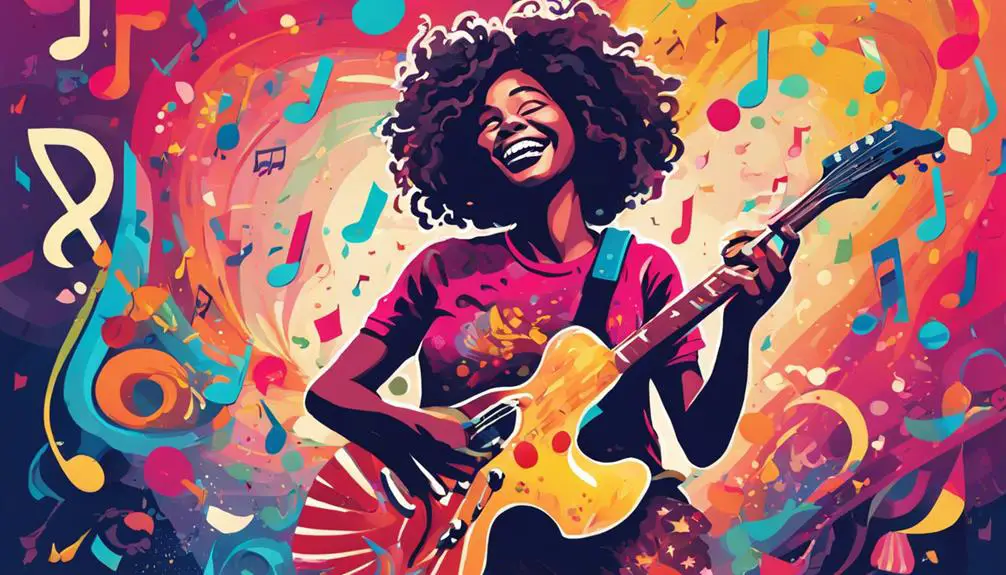When you want to express your cravings in Spanish slang, you'll need to know the right phrases to sound natural. In casual conversations, you can use expressions like 'me muero por' or 'me encantaría' to convey your longing. But be careful with the subtle distinction between 'morir' and 'morirse' to avoid miscommunication. To add authenticity to your conversations, learn slang expressions like 'tener ganas de' or 'estar con las ganas de' to show your strong desire. As you explore the nuances of Spanish slang, you'll discover more phrases to convey your cravings with confidence and flair.
Craving in Casual Conversations

When you're chatting with amigos in a Madrid café, you might hear them express their cravings using colloquial expressions that go beyond the formal 'tengo ganas de' (I feel like). In casual conversations, Spaniards often use informal phrases to express their everyday longings. You might hear 'me muero por' (I'm dying for) or 'me encantaría' (I would love to) when discussing craving conversations. These phrases are commonly used in everyday conversations, especially among friends.
In Spain, it's common to express cravings for food, drinks, or activities using colloquial language. For instance, you might say 'me duele que no tengo dinero para un café' (it kills me I don't have money for a coffee) to express a strong desire for a coffee. These phrases are an essential part of Spanish slang and can help you sound more natural in your conversations.
Slang Expressions for Desire
Craving something in Spanish often involves using slang expressions that convey a strong sense of desire, such as 'morir por' (to die for), 'estar hasta la madre de' (to be up to here with), or 'estar que trina' (to be bursting with), which can add a touch of authenticity to your conversations.
When expressing desire in Spanish, it's crucial to use the right dialects and phrases to convey your passion. Here are some slang expressions to help you do just that:
| Expression | Meaning | Example Sentence |
|---|---|---|
| Morir por | To die for | Me muero por ese pastel (I'm dying for that cake) |
| Estar hasta la madre de | To be up to here with | Estoy hasta la madre de trabajar (I'm up to here with working) |
| Estar que trina | To be bursting with | Estoy que trina de hambre (I'm bursting with hunger) |
| Tener ganas de | To feel like | Tengo ganas de ir al cine (I feel like going to the movies) |
| Estar con las ganas de | To be eager to | Estoy con las ganas de ir de compras (I'm eager to go shopping) |
Morir and Morirse Meanings

You may have used 'morir' in expressions like 'morir por' to convey a strong desire, but do you know the nuances of 'morir' and its counterpart 'morirse'? These two verbs, both meaning 'to die,' have distinct connotations that can greatly alter the tone of your message.
In Spanish, 'morir' is often used to express a strong longing or craving, as in 'morir por' (to die for) something. This phrase is commonly used in informal settings to convey enthusiasm or passion.
However, 'morirse' has a more literal connotation, implying a sense of death or extinction. This subtle distinction is essential, as using the wrong verb can change the tone of your message from casual to dramatic.
Understanding the idiomatic differences between 'morir' and 'morirse' is essential to navigate the nuances of Spanish slang. While 'morir' adds a touch of playfulness to your language, 'morirse' can come across as more intense or even morbid.
Me Muero and Similar Phrases
While exploring the world of Spanish slang, you'll frequently stumble upon phrases like 'me muero' (I'm dying) or 'me encanta' (I love it), which convey an intense longing or enthusiasm for something. These phrases are often used to express strong emotions, such as excitement, admiration, or even obsession.
| Phrase | Meaning |
|---|---|
| Me muero | I'm dying (expression of extreme enthusiasm) |
| Me encanta | I love it |
| Estoy hasta la madre | I'm fed up (expression of frustration) |
The origins of 'me muero' can be traced back to the idea of being so overcome with emotion that one feels like they're dying. This phrase is often used to express emotional extremes, such as excitement or passion. For example, if someone says "me muero por ese tipo de música" (I'm dying for that type of music), it means they're extremely enthusiastic about it. By using these phrases, you'll be able to convey your emotions more effectively and sound more natural in your Spanish conversations.
Intense Enthusiasm in Spanish

When expressing intense enthusiasm in Spanish, you'll often hear phrases like 'estoy flipando' (I'm flipping out) or 'me vuelve loco' (it drives me crazy), which convey a sense of unbridled excitement or passion. These phrases capture the fervent passion and energy that comes with being extremely enthusiastic about something. You might use 'estoy emocionado/a' (I'm excited) or 'me encanta' (I love it) to express your enthusiasm in a more subdued way.
However, when you really want to emphasize your excitement, you'll hear phrases like 'estoy que me muero' (I'm dying) or 'me tiene loco' (it's driving me crazy), which convey a sense of being completely swept up in the moment.
In Spanish, intense enthusiasm is often expressed through hyperbole, where the speaker exaggerates their emotions to convey the intensity of their feelings. This can be seen in phrases like 'me muero de risa' (I'm dying of laughter) or 'me vuelvo loco' (I'm going crazy), which convey a sense of being completely overwhelmed by emotion.
Craving Food and Drinks in Slang
From fervent passion to fervent hunger, Spanish slang is also rich in expressions that convey intense cravings for food and drinks. When you're hungry, you're not just hungry – you're "muerto de hambre" (dead from hunger). And when you're thirsty, you're "sediento como un camello" (thirsty like a camel).
| Expression | Meaning |
|---|---|
| Comida corrida | Food craving |
| Bebida emocionante | Exciting drink |
| Morir por algo | To die for something (e.g., a delicious dish) |
| Tener una hambre de lobo | To have a wolf's hunger (to be very hungry) |
These expressions will help you sound like a native when ordering food or describing your cravings. For instance, you can say "Tengo una comida corrida por una hamburguesa" (I have a craving for a hamburger). Or, "Este café es una bebida emocionante" (This coffee is an exciting drink). Now, go ahead and indulge in the rich flavors of Spanish slang!
Frequently Asked Questions
Is "Tengo Ganas" Only Used for Food Cravings?
You might think that 'tengo ganas' is only for food cravings, but it's not that simple. In reality, you use 'tengo ganas' to express emotional desires or cravings, not just for food.
This phrase is deeply rooted in cultural influences, where desires go beyond physical needs. You can say 'tengo ganas de' to express a strong longing for something, like spending time with loved ones or pursuing a hobby.
It's a versatile phrase that captures the complexity of human desires.
Can "Morirse" Be Used in Formal Writing?
When writing in a formal tone, you'll want to exercise caution with the phrase 'morirse.' While it's a common expression in informal settings, it may not be suitable for formal writing, especially in a literary context.
You'll typically reserve 'morirse' for casual conversations or creative writing that aims to replicate everyday speech.
For formal writing, opt for more formal phrases that convey the same meaning without the colloquial tone.
How Do You Respond to "Me Muero" in a Conversation?
When someone says 'me muero' in a conversation, you're likely to encounter a mix of emotional intensity and playful teasing.
You respond by acknowledging their enthusiasm, saying '¡estoy de acuerdo!' (I agree!) or '¡eso es increíble!' (that's amazing!).
If you want to play along, throw in a lighthearted 'me muero de risa' (I'm dying of laughter) to keep the banter going.
Remember to keep it casual and light, as this phrase is often used in informal settings.
Are "Morir" and "Morirse" Interchangeable in Slang?
A million things are running through your mind as you navigate the complexities of Spanish slang!
When it comes to 'morir' and 'morirse', you're wise to wonder if they're interchangeable.
In slang, nuances matter. While both verbs mean 'to die', 'morirse' is more informal and used in idiomatic expressions like 'me muero' (I'm dying, meaning 'I'm laughing so hard').
'Morir' is more formal and literal. So, no, they're not entirely interchangeable, but understanding the distinction will make you a master of slang nuances.
Is "Crave" Always Translated to "Ansiar" in Spanish?
You're wondering if 'crave' always translates to 'ansiar' in Spanish. The answer is no.
When you crave something, it implies a strong desire or longing. In Spanish, 'ansiar' conveys a sense of enthusiasm or impatience, but it's not the only translation.
Depending on the context, 'crave' can be translated to 'anhelar', 'desear', or 'codiciar', each capturing different nuances of the word.
Be mindful of these translation variations to guarantee accurate expression of your intended meaning.
Conclusion
You've mastered the art of craving in Spanish slang, and it's like having a superpower in your back pocket. Now, you can express your desires with ease, whether it's for a delicious meal or a thrilling experience.
Remember, morir and morirse are more than just phrases – they're doors to a world of intense enthusiasm. Use them wisely, and your conversations will be as vibrant as a work of art.







